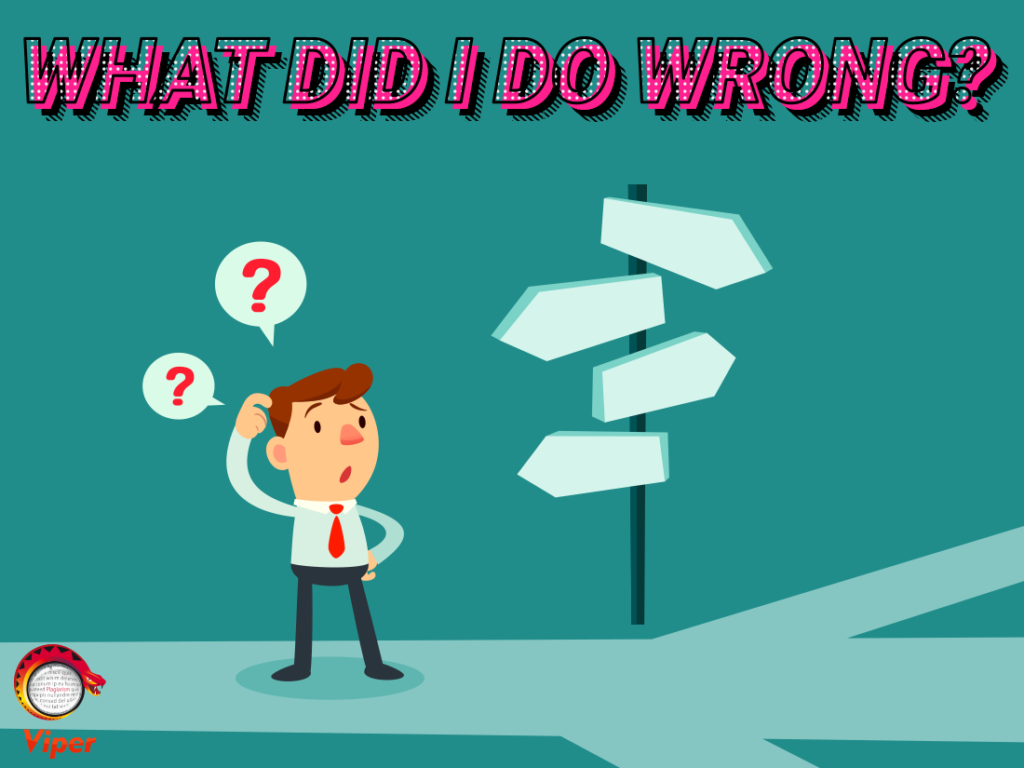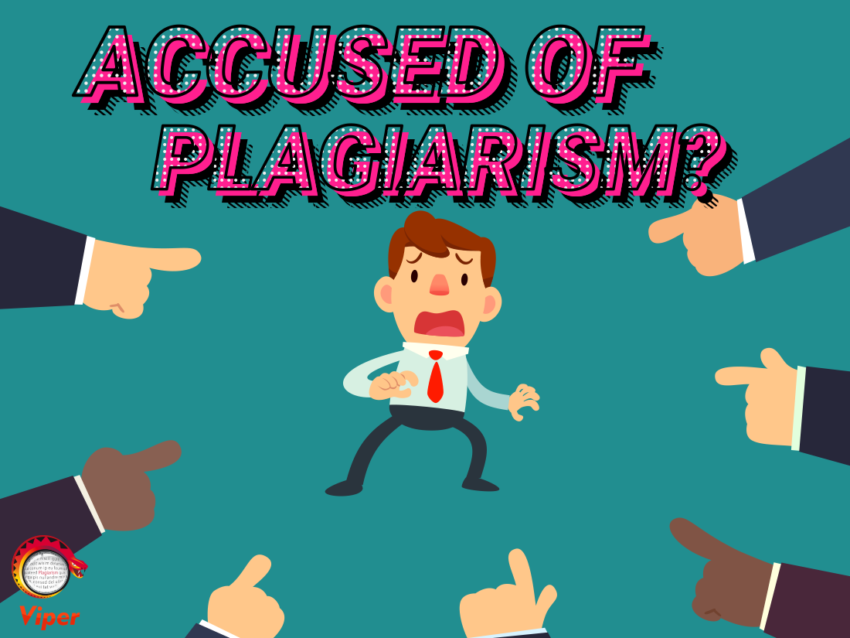Being accused of plagiarism is one of the most stressful things that can happen to you during university. In this article, I’ll go over some of the basics behind being accused, including understanding the potential reasons and some handy tips to deal with the situation.
Have you been Accused of Plagiarism?
When starting university, the last thing you think of is plagiarism. It simply isn’t something you about, especially during your first year where you are still trying to adjust to living away from home. Honestly, what is Plagiarism? Only some people understand the intricacies of it, while most people don’t seem to have a clue! I remember when I started my degree – not thinking about the effects of plagiarism until my second year! Truth be told, back then I still had to print and hand in my essays. Nowadays, you submit everything digitally, meaning that your work will most definitely be put through a plagiarism scanner. And with the huge growth in AI writing tools such as ChatGPT and OpenAI, it is easy to see that universities are going to continue investing heavily in new and more intelligent plagiarism checking applications.
So, what would happen if you were to be accused of plagiarism? Surprisingly, being accused of such a thing doesn’t entirely mean that you are a cheat. Plagiarism is a complex concept, meaning that it does not necessarily mean you have directly copied from someone. So, if you have been accused, stay calm. Try and use this accusation as a learning tool to better understand plagiarism and how it is you could avoid it in the future.
5 Steps for Dealing with Plagiarism Accusations
Make sure to not overreact!
So you’ve spent hours and hours in the library working hard, finishing your essay. Suddenly your results come back stating that you have plagiarised! Above all; don’t worry! The first thing to do is find out the basics: what the problem is, and what the process your university follows to investigate the problem. Unfortunately, some universities can treat plagiarism investigations like a witch hunt, making vague accusations and having an unbalanced investigation process.
Investigation Process
I recommend taking these simple steps to deal with a plagiarism accusation:
- Stay focused! Don’t overreact or get angry. Calmly ask for more details. Make sure you keep clear, detailed notes throughout the entire process, with dates and times. In addition, you should write down anything you think may be useful. Keep a record of everything you say in case you need to refer back to it.
- Ask what the problem is exactly and ask for the proof of the issue – this is probably going to be the plagiarism report showing the matching text in your work, and importantly, what source it is matched to.
- If it’s appropriate, ask your tutor if you can sit down and go through the issue and have them explain their concerns. Once you have done this, you will have a better idea of what exactly went wrong. As a result, it gives you an initial chance to explain your reasoning. Additionally you might be able to resolve it at this stage before it goes further.
- If you’ve made a simple mistake and after talking with your tutor you realise this, be honest and admit it. After all, honesty is the best policy and simple mistakes are usually forgiven – it’s your opportunity to learn and not make the same mistake again. You’ll likely save the university from undergoing a long, complicated process and have the chance to resolve the issue there and then.
- If you feel the accusation is unfair – that you didn’t make a mistake, or the proof doesn’t support the claims made, calmly explain your understanding and that you don’t feel that you plagiarised. After that you should ask about the next steps in the investigation.
- From here, the university should adopt a formal process, usually with a plagiarism committee. This should be clear, simple and easy to follow.
Plagiarism Committees
Usually, a plagiarism committee is gathered and will be asked to independently review the case based on the facts at hand. This could take place over a number of different meetings and steps.
You’ll probably be asked to submit additional proof to support your assertion that you didn’t plagiarise. This could be showing some of your draft work, or explaining your research process. You could be questioned on the subject matter of your coursework to prove you understand it and did in fact complete it. In addition, you may be given the opportunity to bring a friend or fellow student with you to meetings to provide emotional support. You might even be entitled to seek legal advice if you wish.
Top Tips
The key is: throughout, remain professional, confident, and calm. Don’t become too emotional. By directly claiming your innocence or refusing to admit a mistake might appear to question your tutor’s professionalism – which might not go down well and set you off on the wrong foot. In other words, before you claim innocence or admit your guilt, make sure you first understand the reasons behind the accusation, and if you’ve actually done something wrong (intentionally or not), made a simple mistake, or the accusation is false.
Understand the reasons behind the accusation

So, how can it be that you’ve been accused of plagiarism? Well, there are a few situations and reasons that might explain why…
Situation 1: Your work might have shown a high percentage of similarities on the plagiarism scanner your university uses
AKA a “content match”. Some of your work is matching to something else – it could be a book, journal, website, or another students work.
Reasons why:
- You have poorly paraphrased references. Maybe you’ve attempted to reference but ended up writing too similarly to the original source.
- You’ve self-plagiarised – for example you have copied some of your work from a previous assignment.
- You’ve plagiarised – intentionally (!!) or unintentionally. You have copied some information from somewhere else – most likely, you copied it for reference, but forgot to paraphrase it.
Situation 2: You have not provided the references needed after using other people’s ideas.
This is “failure to reference”, a common mistake – technically this is plagiarism, as you have failed to reference the original author.
Reasons why:
- You used some ideas or information from a source, however forgot to include a reference to the original author.
- You intentionally used some ideas and didn’t use a reference because it was low quality (e.g. Wikipedia) or you wanted to pretend it was your own idea.
Situation 3: Your tutor thinks that there is a significant change in your writing style (its suddenly very different) or your standard has suddenly changed from your previous assignments (you’ve gone from low marks to high marks suddenly)
AKA “academic misconduct”. Here, your tutor may have no direct or specific proof, but they think that your work doesn’t look like you complete it.
Reasons why:
- Your tutor might think you had help, for example from a friend, family member or other students.
- Similarly, they might think you copied from a source the plagiarism scanner couldn’t access (like a family members old work).
- They might think you bought your work online.
If you believe that a simple mistake was made, like for example, thinking that some information is perceived as common knowledge and doesn’t really need to be referenced, then you could start a dialogue to discuss this. Remember, teachers are human too! So, they can also obviously make mistakes. Just remember to stay calm and professional and to put your argument forward without being too confrontational. If you have been accused of plagiarism, simply discuss the different issues with your teacher and face the situation as a problem that can be solved. This will show that you are very serious about solving this and that you will work hard to avoid it in the future.
Use it as a learning curve!
In other words, turn the negative into a positive! How you may ask? Easy: learn from it and most importantly, don’t let it get you down! This experience can serve as a learning tool. For example, make your tutor know that you are willing to learn about plagiarism and how to avoid it. Discuss the issues within your work and do your best to understand them and learn from them. In other words, this will show that you are taking full responsibility for the mistakes you have made and that you will make sure they won’t happen again.
At the end of the day, teachers will always have to be fair and ensure that all students who get good marks get them on merit. This is why it is their responsibility to pursue any suspicions of plagiarism in any students work. So, if you are accused of plagiarism, don’t react, but learn! Try to understand what the problem is and try to make sure that it does not happen again. It’s unlikely you would be expelled from your school for one anomaly on one assignment, so use the accusation as an opportunity to learn from it!
Avoid plagiarism accusations by being prepared
In conclusion, the best way to avoid plagiarism accusations is by being prepared. Make sure you carefully follow the rules of your university: always reference, paraphrase correctly, and don’t be tempted to cut corners or be a little bit naughty! For extra peace of mind, scan your work with a plagiarism scanner – like Viper – before you submit it to your university. This gives you a chance to review a plagiarism report before handing in your work, allowing you to spot any small mistakes like poor paraphrasing before it’s too late!
